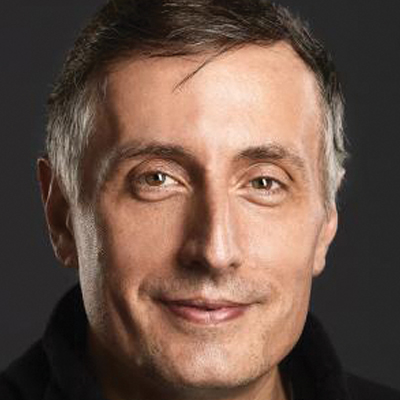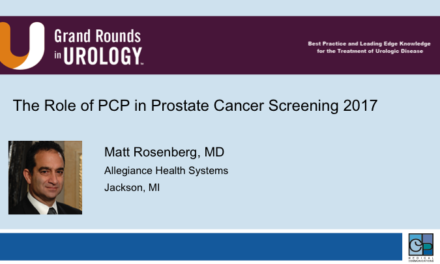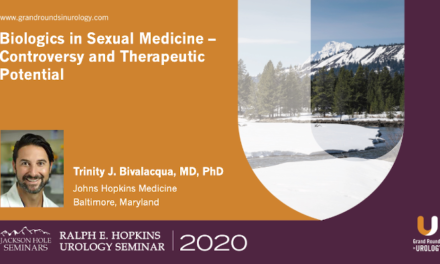Mark A. Moyad, MD, MPH, and Martin M. Miner, MD, presented “Testosterone, Weight Loss / Weight Gain, and Testosterone Replacement Therapy (TRT)” for the Grand Rounds in Urology audience in February 2022.
How to cite: Moyad, Mark A, and Miner, Martin M. “Testosterone, Weight Loss / Weight Gain, and Testosterone Replacement Therapy (TRT).” February 2022. Accessed Apr 2024. https://grandroundsinurology.com/testosterone-weight-loss-weight-gain-and-testosterone-replacement-therapy-trt/
Testosterone, Weight Loss / Weight Gain, and Testosterone Replacement Therapy (TRT)
Mark A. Moyad, MD, MPH, the Jenkins/Pokempner Director of Preventive/Complementary and Alternative Medicine (CAM) at the University of Michigan Medical Center in the Department of Urology in Ann Arbor, Michigan, and Martin M. Miner, MD, Co-Director of the Men’s Health Center and Chief of Family and Community Medicine for Miriam Hospital, and Clinical Professor of Family Medicine and Urology at the Warren Alpert Medical School of Brown University in Providence, Rhode Island, investigate the ways in which body mass index (BMI) correlates with testosterone levels and how this knowledge can be used in a medical setting. Dr. Moyad begins the discussion with Dr. Miner’s presentation on the possibility of testosterone needs increasing as BMI increases, wherein Dr. Miner found that obese men required higher doses of testosterone to reach eugonadal levels than men who were not obese. Dr. Miner states that he expects the results of a long-term safety study of testosterone will soon show that testosterone therapy is safe over the long term, allowing physicians and researchers to focus on the symptomatic benefit of testosterone in areas such as mood and cardiovascular risk. Dr. Moyad asks if weight loss and increased fitness could possibly reduce the need for testosterone therapy, to which Dr. Miner responds that it may be possible if both weight loss and a reduction in comorbidities occur but it is unlikely in patients over 60. They conclude that weight loss can help make testosterone therapy more effective but it is unclear if it would be enough to reduce testosterone therapy altogether because of a multitude of genetic variables.
For more from Drs. Moyad and Miner on testosterone, check out their discussion on Testosterone as a Fasting Blood Test.
About the Authors
Mark A. Moyad, MD, MPH
Dr. Moyad is the Jenkins/Pokempner Director of Preventive/Complementary and Alternative Medicine (CAM) at the University of Michigan Medical Center in the Department of Urology. He occupies an endowed position, which was originally created and funded entirely by the patients he has helped over the past 25+ years. This was the first endowment of its kind created for a physician at a major medical center in the US. Dr. Moyad has always considered himself to be, first and foremost, a physician public health educator. Dr. Moyad believes in the power of lifestyle changes to improve overall mental, physical, and spiritual wellness, and in their potential ability to keep pill counts and dosages to a minimum, while also enhancing the impact of conventional treatments when needed. This has been the focus of his research and lectures his entire career. Dr. Moyad received his medical education from the University of South Florida College of Public Health and the Wayne State University School of Medicine. He is the primary author of over 150 published medical journal articles on the subject of lifestyle changes and supplements, the past Editor-in-Chief of the medical journal Seminars in Preventive & Alternative Medicine, and has given 1000s of lectures around the world to public and health care professionals in virtually every medical specialty and major medical center. Dr. Moyad is the author or co-author of 15 academic and consumer books, including the Integrative Medicine Clinical/Teaching Guidebooks, the Promoting Wellness series for patients, and his public bestseller The Supplement Handbook. He is honored to be the moderator of one of the largest patient conferences held twice a year in Los Angeles, California, and has provided monthly educational clinical research updates for the last 15+ years to health care professionals and national patient advocacy groups. He has been a consultant and/or interviewed for most major magazines, websites, radio and television shows devoted to health in the US, and appears regularly on a variety of programs.
Martin M. Miner, MD
Martin M. Miner, MD, is Co-Director of the Men’s Health Center and Chief of Family and Community Medicine for Miriam Hospital in Providence, Rhode Island. He is also Clinical Professor of Family Medicine and Urology at the Warren Alpert Medical School of Brown University in Providence and has been charged with the development of a multidisciplinary Men’s Health Center within the Lifespan/Brown University system. Dr. Miner received his MD from the University of Cincinnati College of Medicine in Ohio. He completed his residency at Brown University and spent time working with the Indian Health Service Corps and the Public Health Service. Dr. Miner presently holds memberships in the American Academy of Family Physicians, the Rhode Island and Massachusetts Academy of Family Physicians, and the American Urological Association, and is a Fellow of the Sexual Medicine Society of North America. He is also a member of the International Society for the Study of Women’s Sexual Health and the former president of the American Society of Men’s Health. He has published extensively in the areas of erectile dysfunction and cardiovascular disease, benign prostatic hyperplasia and lower urinary tract symptoms, and male sexuality and hormonal replacement therapy in men.






